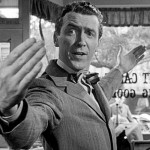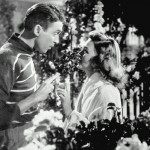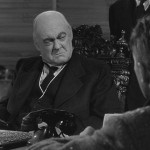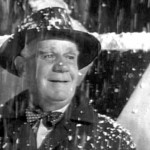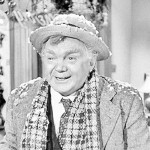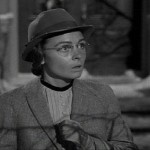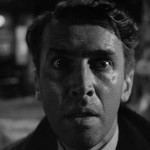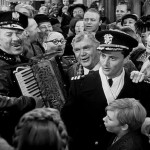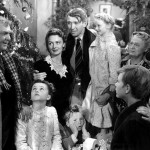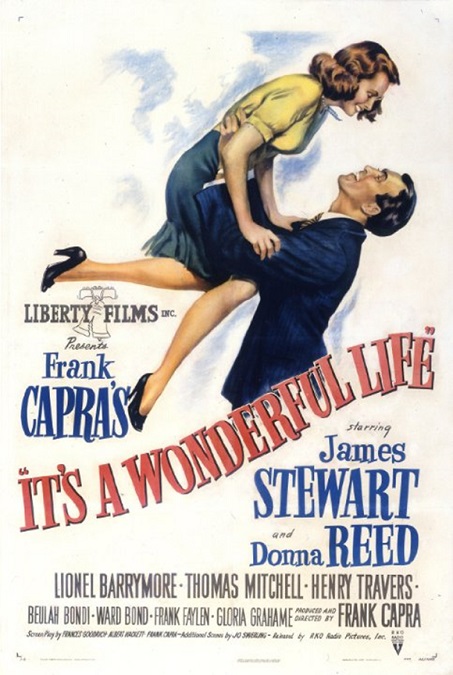
It’s a Wonderful Life – 1946
Wow! I have a lot to say about this movie. I’ll start off by saying that I know that this is probably the most beloved Christmas movie of all time. But that being said, the fact that the story took place at Christmas time was incidental, so I don’t really consider it a Christmas movie. There were no messages of holiday cheer, no Santa Clause, no gift-giving, and no Christ Child. The point of the movie has nothing at all to do with the holiday.
The message of the film is that every life has an impact on the world around them in ways that he can never see. The lead character, George Bailey, played by James Stewart, is a man who always thinks of others before himself. He is kind and generous, and willing to give the shirt off his back to anyone who might need it. When tragedy strikes, and he falls into suicidal despair, he is shown a vision of what the world would have been like if he had never been born. Christmas just happens to be a coincidence.
Up until now, I have only seen Stewart in light-hearted roles in movies like You Can’t Take It With You, The Philadelphia Story, and Mr. Smith Goes to Washington, the latter being the most dramatic example. But here, Stewart shows us a dark and all too realistic side of his skills as an actor. There was one scene in particular, in which he comes home to his family and has a violent break-down in front of his wife and young children. I have to give Stewart a hearty round of applause for his wonderfully disturbing performance.
George’s wife, Mary, is played by Donna Reed, in a performance that makes you fall in love with her. She wasn’t director, Frank Capra’s, first choice to play the role, but she did an excellent job. She brought innocence and sweetness paired with confidence and strength to the performance, making her captivating to watch.
The town’s villain was Henry Potter, played by Lionel Barrymore. He was like Scrooge in Charles Dickens’ A Christmas Carol: rich, greedy, crotchety, and unfeeling, especially when it came to the poor. Barrymore played his part well, but there was something interesting about the character which I feel is worth mentioning. Capra was able to sidestep the Hayes Code, which stated that every evil-doer had to be punished by the end of every film. Potter, who stole money from Bailey’s loan business, causing George to attempt suicide, was never caught. Sure, his nefarious plan is thwarted as George’s business is saved by all the people he had helped throughout his life, but Potter gets away scot-free.
There were so many things to love about this film. Like many Americans, I remember watching it nearly every Christmas as a child, but it has probably been about 25 years since I have seen it. I didn’t remember most of the details shown in the set-up that takes place before the suicide attempt. Most of what I remembered was from the fantastic alternate reality which makes up the last quarter of the film.
The AS-2 (that’s Angel: Second Class to all of you), George’s guardian angel, Clarence Odbody, is beautifully and memorably played by Henry Travers. He had a kindly look and a gentle manner which made him instantly likeable. He is chosen to take George’s case and guide him to a greater understanding of the positive aspects of his life, showing him that suicide would be a mistake because his life of generosity and kindness has really been a wonderful one, not worthy of being thrown away.
The scope of the film was very powerful because Capra took the time to really let us get to know the main character. He was the every-man, or at least the one we all aspire to be. He was generous to a fault, and stood up for what he believed to be right. The film touches on themes of love and romance, hope and joy, with a healthy dose of fantasy and a touch of the divine. Sure, these words are often used to describe Christmas, but I stand by my claim that it isn’t necessarily a Christmas movie.
Another thing I liked about the movie was its nostalgic feel. It was a bit of a snapshot of an America that I have never experienced, yet one that I would have liked to. It is a reminder of a simpler time where people were generally happy and more compassionate to their fellow men. It was a time of innocence and sincerity, peace and… well not really peace. Of course Capra had to throw the WWII angle into the script, making George’s brother Harry a celebrated fighter pilot.
Other notable actors in the film were Thomas Mitchell as George’s bumbling uncle Billy, the man who lost the money, Gloria Grahame as Violet Bick, the town’s sexy girl, Sheldon Leonard as Nick the Bartender, H. B. Warner as Mr. Gower, George’s first employer, Frank Faylen as Ernie Bishop, the Cab Driver, and Ward Bond, the Cop. They all did a fantastic job.
But just as a last thought, I have to ask… Who would actually name their daughter Zuzu?
